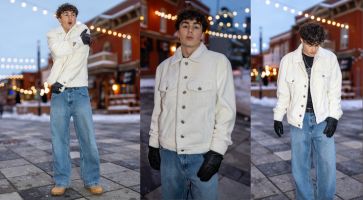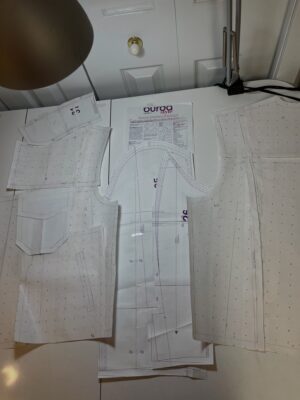
I walked into Fabricville, and there it was: a bolt of plush, pristine white mink faux fur. You know that feeling when a material screams, “Make me into something outrageous”? My mind immediately flashed to Pharrell’s fall-winter 2025 collection for a renowned French luxury house—specifically, that iconic, unattainable trucker jacket. The original was real mink and the price was strictly “upon request,” but I knew I could capture that cosmic, luxurious vibe myself.
Plus, I could totally see both of my sons rocking this style, elevating casual to cosmic heights! The decision was made, and 2 meters of Anchorage hairy coating and luxurious Bemberg lining came home with me.
To start, I reused a reliable Burda pattern from a previous project, but heavily adjusted the style lines to match the original high-fashion inspiration. I essentially hacked the pattern to:

This was my first dance with faux fur, and I have to admit, it’s not as scary as it looks! My core sewing approach didn’t need to change much, just some adjustments to accommodate the thickness of the material. Because of this bulk, I chose to use complementary linen in areas that needed less weight, like the under-flaps, inner pockets, and undercollar.
The real challenge hit way before the sewing machine: the cutting. This fur shed like crazy at the cut lines! The room was instantly filled with fibers, and honestly, even after a good clean-up, I was sneezing my way through the entire project because the shedding just wouldn’t quit.
A word of advice: Unlike natural fur, faux fur has a definite direction of the pile, just like velvet or corduroy. It’s crucial to notice this and cut all your pattern pieces accordingly. I chose to cut mine so the fibers would “face” downward for a smooth, cohesive look.
Structuring the inner workings was a fun challenge. I wanted to preserve the plush, soft “jersey” quality of the faux fur while still creating a stable jacket. My approach was selective interfacing:
This multi-layered approach gave me that perfectly soft, yet totally stable, construction.
To complete the trucker jacket vibe, I finished the buttonhole front with a decorative zig-zag stitch and opted for sleek, shiny metal buttons. I deliberately skipped the traditional post/jeans buttons you see on denim jackets. Why? Because I was trying to preserve the soft, jersey quality of the faux fur. I wasn’t confident the fabric would be stable enough to securely hold those narrow posts without distortion. Plus, the best results for hardware like that really require a dedicated snap-attaching machine, which I haven’t invested in… yet!
The universe smiled on me when it came time for the photoshoot—the first snow of the season arrived just as the jacket was finished! Unfortunately, my oldest son, the intended recipient, was tied up with school. So, my youngest stepped in to model it for us… and now I’m afraid this faux white mink fur trucker jacket might end up permanently in the wrong closet!
My takeaway from this highly satisfying project is simple: conquer the fear of the unknown, and always try something new. I successfully re-created a luxurious, cosmic look, learned a thing or two about working with fuzzy fabrics, and definitely didn’t break the bank doing it. Now, who’s ready to tackle their own luxury DIY?